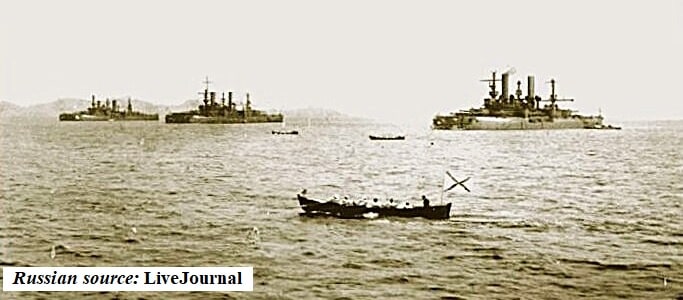
Battleships Petropavlosk, Sevastopol and Poltava
1. THE POSITION OF THE BUND 1 IN THE PARTY.
The idea that Jews constitute a separate nation is absolutely untenable scientifically and politically reactionary.
[...]
That is precisely what the Jewish problem amounts to: assimilation or isolation. The idea of a Jewish "nationality" is definitely reactionary, not only when expounded by its consistent advocates (the Zionists) but also by those who try to combine it with Social-Democracy (the Bundists).
The idea of a Jewish nationality runs counter to the interests of the Jewish proletariat for it fosters directly or indirectly a spirit hostile to assimilation, the spirit of the "ghetto."
2. STATEMENT OF RESIGNATION FROM THE PARTY COUNCIL AND FROM THE EDITORIAL BOARD OF THE CENTRAL ORGAN.
Inasmuch as I do not share the opinion of G. V. Plekhanov, member of the Party Council and of the editorial board of the Central Organ, that it will be in the interest of Party unity to make a concession to the Martovites at the present time and co-opt the editorial board of six, I hereby resign from the Party Council and from the editorial board of the Central Organ.
N. Lenin
Geneva, November 1, 1903.
P.S. At all events I by no means refuse to support the new central Party institutions with my work to the best of my ability.
Handed to Plekhanov on November 1, 1903.1
3. THE NARODNIK-LIKE BOURGEOISIE AND DISTRAUGHT NARODISM.
Social-Democrats from the very start call on the proletariat to take the first revolutionary step (against the autocracy) in conjunction with well-to-do peasants in order to then go farther, at once, either in conjunction with the peasant bourgeoisie against the landlord class or against the peasant bourgeoisie and the landlord class if they have joined forces.
4. MAY DAY.
The war between Russia and Japan is showing up the utter rottenness of the autocratic order ever more clearly and vividly, the utter criminality of the police and court gang ruling Russia. Our people are perishing from want and starvation at home, yet they have been dragged into a ruinous and senseless war for alien territories inhabited by foreign races lying thousands of miles away.
5. HOW THE RUSSO-JAPANESE WAR STARTED.

A skirmish between Russian and Chinese troops on the Manchurian railway line at "Chefira" (?) left three Russian soldiers dead, ten Chinese captured.
Russia pressed Prince Ching in Peking to entreat the French, British and American delegations to help find a peaceful solution to the conflict pending between Russia and Japan. The French Minister accepted the task, the British and the Americans rejected it.
Grand Duke Alexei presided the St. Petersburg conference convened to resolve the conflict between Russia and Japan peaceably.
St. Petersburg: Russia's reply to Japan is satisfactory.
London: Russia's reply is disquieting; war is inevitable.
Tokyo: The Japanese government has acquired a large number of rams.
Tienjin: Russia has purchased 20,000 tonnes of coal.
St. Petersburg: The Japanese Minister says that the Empire's latest answer to Russia is the definitive one.
London: King Edward promised in a speech to Parliament to work toward a peaceful resolution of the conflict between Russia and Japan.
Paris: Russia's latest diplomatic note makes important concessions couched in terms that show a desire to maintain the peace.
London: Britain urges Russia to leave Manchuria.
St. Petersburg: War between Japan and Russia is imminent. The pro-war party at the palace has mollified the Czar's misgivings. It is believed that Russia makes important concessions but rejects any rights of Japan over Manchuria and warns Japan to fortify not the Korean coastline.
Tokyo: Japan declared its intention of breaking off diplomatic relations with Russia.
St. Petersburg: The middle class welcomed the news of the outbreak of war enthusiastically. The common people reacted with indifference.
Tokyo: The common people parade through the streets, disparaging Russia.
Urgent 11:00 AM. Paris: Japanese torpedo boats have disabled some Russian warships. Japanese warships opened fire on Port Arthur and the Russian naval base returned fire vigorously.
The Japanese action against Port Arthur took place during the night of February 8.
There were uncovered at Port Arthur huge embezzlements of funds earmarked for logistical expenditures.
Evacuation of the civilian population of Port Arthur proceeds apace; 70% of the people have already departed by rail.
The Russian cruiser Petropavlosk sunk after hitting a Japanese naval mine.1,2
6. A LETTER TO THE COMRADES WITH REFERENCE TO THE FORTHCOMING PUBLICATION OF THE ORGAN OF THE PARTY MAJORITY.
A Bolshevik circle abroad finally decided today on the publication of a Party periodical (Vperyod) to uphold and implement the principles of the majority over the structural and tactical discord brought into the Party by the minority.1
| And Now For Something Completely Different |